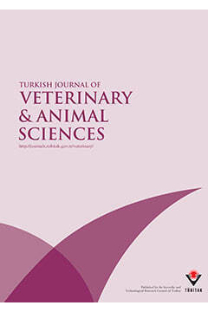The Studies on the Experiments of Preventive Treatment With Sodium Bicarbonate Supplementation to Feeds in Sheep in Which Cases of Ruminal Acidosis
This study was made to determine the degree of protection of sheep against ruminal acidosis after the addition of various concentrations of sodium bicarbonate (3%, 6%, 9%) to acidotic rations (crushed wheat). For this purpose four groups, each group consisting of three animals, were used. This grouping was established according to the rate of sodium bicarbonate (NaHCO 3 ) added to the crushed wheat. Crushed wheat-wheat strax mixture (Base ration, 90; 10, 40 gr/kg) was fed to animals once a day for up to 4 days. NaHCO 3 was added to base ration. Treatments were as follows: No treatment (control, group I), 3% NaHCO 3 of base ration (group II), 6% NaHCO3 of base ration (group III), 9% NaHCO3 of base ration (group IV). The clinical and laboratory examinations were carried out before first feeding (0h) and thereafter 4,8,12,24,36,48,60,72 and 96 hour intervals. At four hours post feeding a decrease in ruminal pH values occured in control and trial groups. At eight hours and afterwards acidosis was detected in the control group but not in the trial groups. As a result, it was determined that the addition of 3%, 6%, or 9% sodium bicarbonate into the sheep ration rich for carbonhydrates would prevent the animals from ruminal acidosis and the adidition of 6% sodium Bicarbonate would be most proper.
Anahtar Kelimeler:
Sheep, Ruminal Acidosis, Prevention, Sodium Bicarbonate.
The Studies on the Experiments of Preventive Treatment With Sodium Bicarbonate Supplementation to Feeds in Sheep in Which Cases of Ruminal Acidosis
This study was made to determine the degree of protection of sheep against ruminal acidosis after the addition of various concentrations of sodium bicarbonate (3%, 6%, 9%) to acidotic rations (crushed wheat). For this purpose four groups, each group consisting of three animals, were used. This grouping was established according to the rate of sodium bicarbonate (NaHCO 3 ) added to the crushed wheat. Crushed wheat-wheat strax mixture (Base ration, 90; 10, 40 gr/kg) was fed to animals once a day for up to 4 days. NaHCO 3 was added to base ration. Treatments were as follows: No treatment (control, group I), 3% NaHCO 3 of base ration (group II), 6% NaHCO3 of base ration (group III), 9% NaHCO3 of base ration (group IV). The clinical and laboratory examinations were carried out before first feeding (0h) and thereafter 4,8,12,24,36,48,60,72 and 96 hour intervals. At four hours post feeding a decrease in ruminal pH values occured in control and trial groups. At eight hours and afterwards acidosis was detected in the control group but not in the trial groups. As a result, it was determined that the addition of 3%, 6%, or 9% sodium bicarbonate into the sheep ration rich for carbonhydrates would prevent the animals from ruminal acidosis and the adidition of 6% sodium Bicarbonate would be most proper.
Keywords:
Sheep, Ruminal Acidosis, Prevention, Sodium Bicarbonate.,
- ISSN: 1300-0128
- Yayın Aralığı: Yılda 6 Sayı
- Yayıncı: TÜBİTAK
Sayıdaki Diğer Makaleler
Determination of Microbiological Quality of Ice-Cream Belong to Various Patisserie in Ankara
İrfan EROL, Özlem KÜPLÜLÜ, Belgin SIRIKEN, T. Halûk ÇELİK
Ankara'daki çeşitli pastanalere ait dondurmaların mikrobiyolojik kalitelerinin belirlenmesi
İrfan EROL, Belgin SIRIKEN, T.Halük ÇELİK, Özlem KÜPLÜLÜ
Sıvı tütsü kullanımının Frankfurter sosislerin depolama stabilitesine etkisi
Histological Investigation on the Stuructural Aspects of Adult Brown Bears' Ovary
İskender YILDIRIM, Ramazan YETİŞİR
Salmonella arizonaeInfection In A Guinea Pig Breeding Unit
Ankara keçilerinde transferrin (Beta globulin) polimorfizmi
